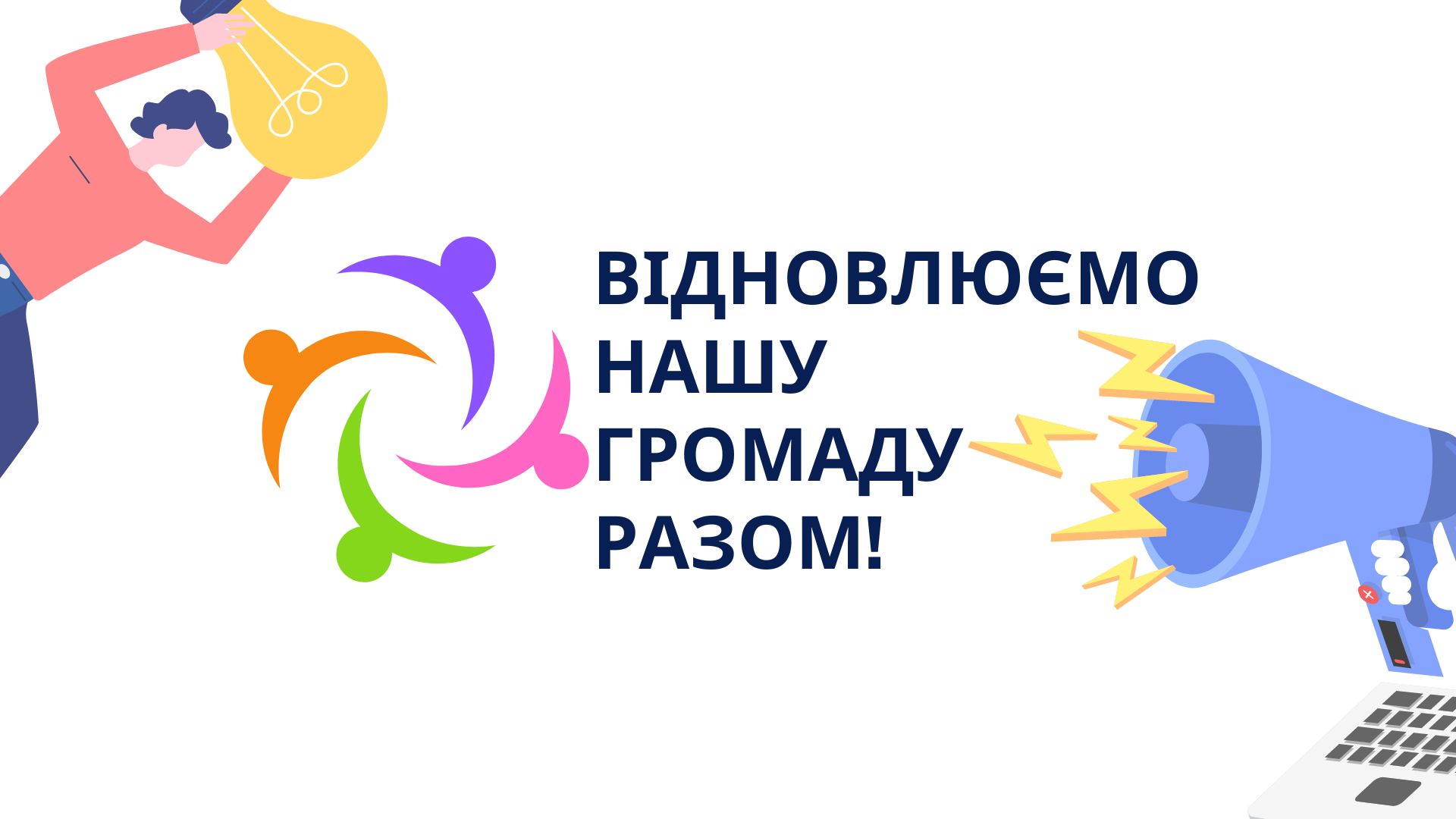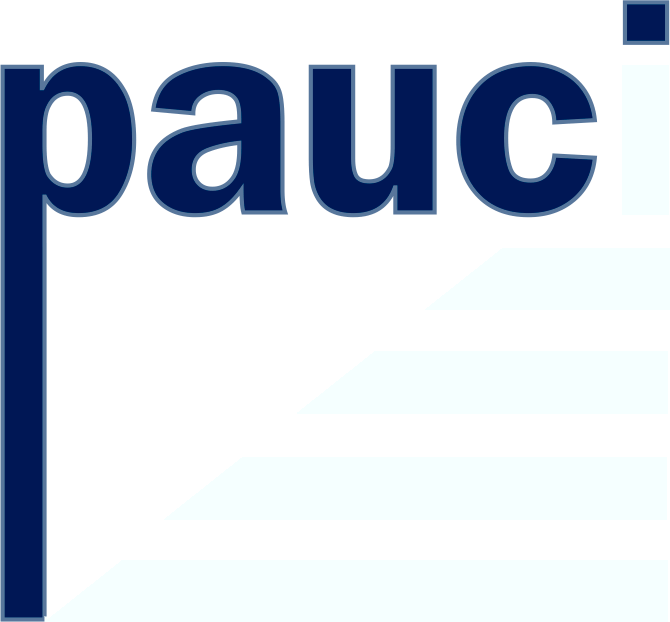
The project "Joint efforts in hromada recovery!"
With the beginning of the full-scale invasion, communities are faced with new challenges, including a falling economy, limited resources, and citizens' changing needs. In the context of the process of restoring communities that were occupied (martial law), the involvement and cooperation of local self-government with the community is of particular importance for the effective and rapid restoration of community life. That is why we initiated the project "Joint efforts in hromada recovery!" among Buchanska, Gostomelska, Ivanovska, Okhtyrska, and Chuguiv hromadas .
Enhance hromada cooperation, including young people, CSO, IDPs, volunteers, and other social groups with the local-level government in the process of early recovery for Kyiv, Chernihiv, Sumy, and Kharkiv Oblast hromadas is the goal of our project, and for this we:
- Survey hromada residents in each of the select communities on the existing recovery challenges and prospects through the representatives of various community groups, including volunteers, CSOs, women, national minorities, youth, IDPs, and other groups. It is also planned to interview residents who relocated from their hromadas to other areas in Ukraine and abroad due to military aggression. The findings will be passed on to local governments to inform the development of local recovery programs, and also presented and used in planning and running dialogue events, and developing mini-projects.
- Organize dialogue events in each of the hromadas to discuss priorities for early recovery and plan joint events involving citizens and local authorities. It is planned to hold 3 dialogue events in each of the hromadas via formats that encourage active engagement, cooperation, and creativity (i.e., a World Cafe, research walks, etc.). It is planned to hold events in different hromada localities, subject to appropriate conditions. Representatives of various groups of citizens, including vulnerable groups, and government agencies will be involved in the events.
- Develop documentation and define criteria for selecting mini-projects for early recovery in communities. For this purpose, the project experts will develop a leaflet to provide background and set out conditions for the early recovery mini-projects component. The criteria and procedure for selecting mini-projects shall be sent to PFRU for approval.
- Jointly develop mini-projects on early recovery select priority areas. For this purpose, initiative groups will be created in each of the hromadas to include representatives of various groups of residents and local authorities; 2 meetings will be held to develop mini-projects for early recovery. Mini-projects will meet the early recovery priorities, which will be determined during research and dialogue activities in each of the hromadas. Mentoring support will be provided during the project development. With expert support a model for the implementation of mini-projects that would provide more stable results for early recovery will be sought - for example, the implementation of a project to install a generator in the point of indestructibility may involve a short training (instruction) on safety, work planning, etc. During preliminary consultations, when writing an application with representatives of public organizations and local authorities, the following examples of project development areas were noted: shelter development and other security measures, development of an information system to inform residents about damage and restoration, cultural restoration projects, etc.
- Select early recovery mini-projects based on the selected priorities in each of the hromadas. To determine the mini-projects that will be implemented in each of the communities, a Selection Committee will be created to include representatives of the donor, CSO, local authorities, volunteer community, etc. It is planned to hold a presentation of the developed projects before the Selection Committee session is held during the final meeting of initiative groups and select those that meet the criteria and will be put up for further funding.
- Implement early recovery mini-projects according to each hromada's selected priorities. Volunteers, IDPs, and trade professionals will be involved in the implementation of the projects if needed. It is planned to purchase relevant services or commodities for the mini-project implementation, and specific categories of work will be carried out by the residents.
- - Disseminate information about the project in each of the hromadas. Over the period of 3 months at least, 5 publications are planned in each of the hromadas, to be posted on the respective local self-government websites, social media pages, and on the web resources of public organizations and initiatives.
- Experience exchange to take place for the relevant hromadas. Organization of two experience exchange events to involve local government representatives, citizens, and other stakeholders. It is assumed that the events will envisage lesson-learned sessions and ways to address the challenges that arose during the project activities implementation.
- Present and disseminate the project's results among the hromadas of Ukraine. The online presentation will contain the results of the project to be shared with the interested hromadas and help disseminate the experience of public engagement with the early recovery processes and local government-citizen liaison. It is also planned to publish the project on all-Ukrainian information platforms.
The conducted activities will result in:
- Citizen involvement in informing the priorities of the early recovery process to reflect the interests of all community residents;
- Increased cohesion between citizens and government, which will contribute to effective interaction and increased level of trust between local authorities and residents;
- Improved transparency of recovery processes through experience exchange and dissemination of information on best practices of cooperation and participation.
The Project Team
- The project coordinator is Kostyantyn Plosky - pauci.kp@gmail.com
- Communication manager Anna Ponomariova - ponomariova27@gmail.com
- Project expert Natalia Lukashenko - onlukash@yahoo.com
- Project expert Natalia Vinnichenko - vinnichenkonataliia@gmail.com
- Facilitator, Okhtyrsk community, Oleg Ovcharenko - oleh.ovcharenko@gmail.com
- Facilitator of the Chuguyiv and Buchan communities, Anzhela Starovoytova – crimeanangela@gmail.com
- Facilitator, Gostomel community, Leonid Donos - ldonos81@gmail.com
- Facilitator, Ivanovska hromada, Natalia Baldych - nataliia.baldych@gmail.com
- Local coordinator, Buchansk community (GO "I am Buchanets") Nataliya Levchenko - nataliaepoch@gmail.com
- Local coordinator, Okhtyr community (GO "Center for the development of street cultures") Pavlo Ignatchenko - deamain@gmail.com
- Local coordinator, Chuguyiv community (Centre of Social Services of the Chuguyiv City Council) Viktoriya Koroshupova - centr.semy.molod@ukr.net
- Local coordinator, Ivanovska Community, Olga Palkova-Svirchevska - elgawork@gmail.com
- Local coordinator, Gostomel community Tetyana Lagovska - t_lagovska@i.ua
